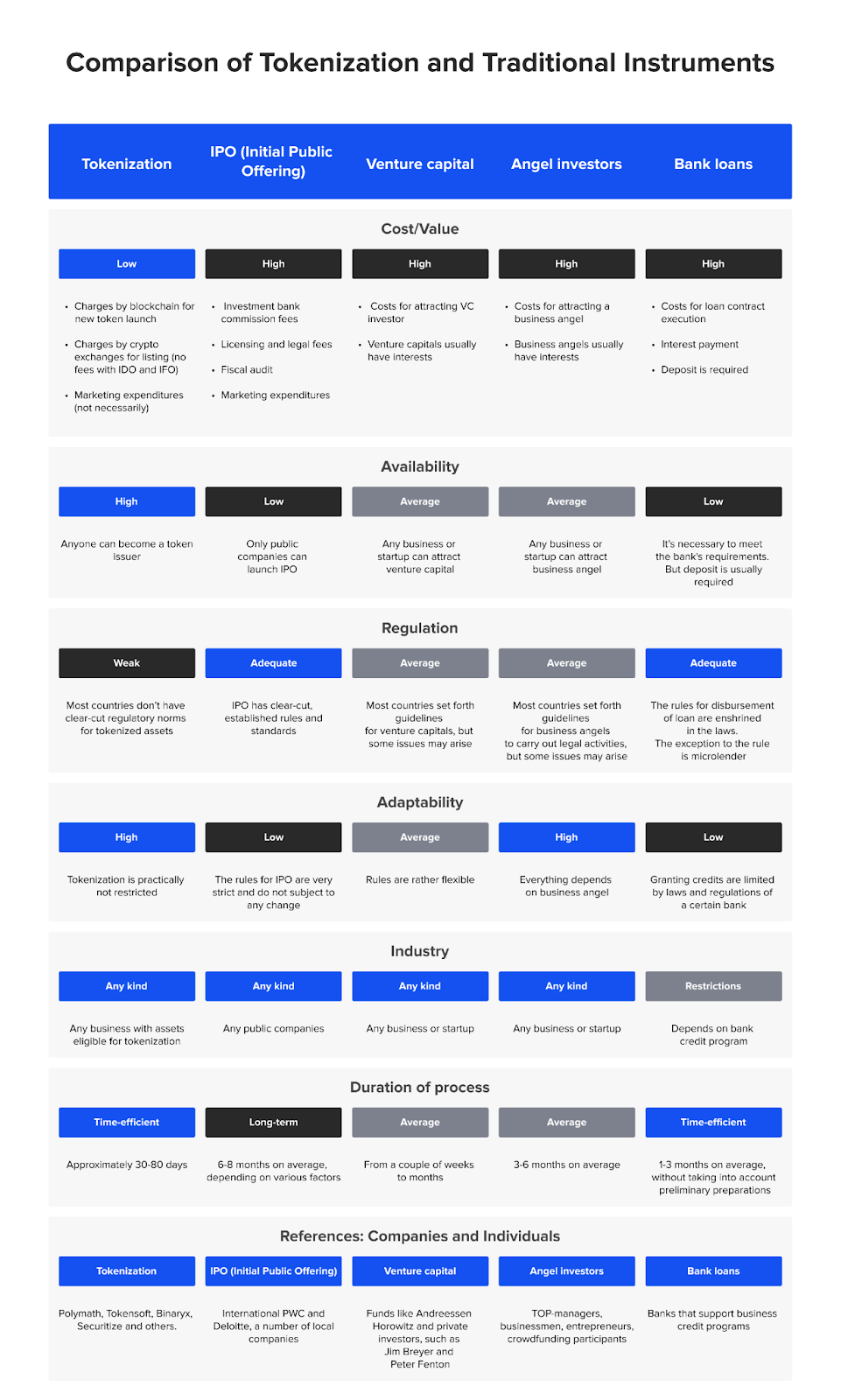There is currently an overwhelming buzz around tokenization. However, it’s still hard to grasp why the transfer of real and virtual assets to a blockchain is nothing short of a revolution in the financial world.
However, it becomes clearer when you compare asset tokenization to conventional financial instruments. By putting these options next to each other, asset tokenization’s offerings and attractiveness stand out.
What is tokenization of assets
Tokenization is a process of transferring the ownership of tangible or intangible assets to tokens on the blockchain. It can be applied to a variety of assets. These include fiat currencies, stocks, shares, real estate, oil barrels, and gold bars. Even copyrights to images, music, or texts, can be tokenized.
Overall, the process of tokenization is relatively simple. All you need to do is issue tokens on the blockchain and assign them appropriate rights.
The first stage doesn’t present any challenges thanks to Ethereum or BSC platforms. However, some issues may arise during licensing of tokens. This is owing to a lack of clear-cut regulatory norms for this market segment.
It still gravely hampers the mainstream implementation of this offering into the world economy. We understand this to be a temporary impediment. It will almost certainly be removed. This will happen as soon as the EU, the U.S., and other countries pass resolutions in this regard.
With respect to the advantages of tokenization, according to Deloitte’s study, “tokenization could make the financial industry more accessible, cheaper, faster and easier, thereby possibly unlocking trillions of euros in currently liquid assets, and vastly increasing the volumes of trade.”
The World Economic Forum (WEF), Deloitte, McKinsey, and Finoa predict that up to 10% of the world’s gross product will be stored on blockchain by 2025-2027.
Comparison funding options
Let’s take a look at the advantages and disadvantages of tokenization in comparison to the traditional investment instruments.

Regulation is the main issue
Asset tokenization can be a win-win solution for investment raising. The main limitation is a lack of regulation in most regions of the world.
Advanced countries are devising mechanisms for control of this investment type. Once this happens, the tokenization market will be the first in line in the race for the biggest share.
Disclaimer
All the information contained on our website is published in good faith and for general information purposes only. Any action the reader takes upon the information found on our website is strictly at their own risk.
- 2016
- Action
- All
- around
- asset
- Assets
- bars
- Biggest
- blockchain
- business
- ceo
- company
- countries
- cryptocurrencies
- currencies
- data
- deloitte
- Development
- digital
- Digital Asset
- Economic
- economy
- Entrepreneur
- estate
- EU
- Euros
- exchange
- executive
- experience
- farm
- Fiat
- financial
- financial services
- fintech
- First
- founder
- funding
- future
- General
- Gold
- good
- HTTPS
- industry
- information
- investment
- investor
- issues
- IT
- Licensing
- Line
- Liquid
- Mainstream
- Market
- Mining
- Music
- offering
- Offerings
- Oil
- Options
- Other
- Platforms
- present
- Product
- projects
- Race
- Reader
- real estate
- Regulation
- regulatory
- Risk
- Services
- serving
- Share
- Shares
- Short
- Simple
- Software
- software development
- Stage
- started
- Stocks
- Study
- tech
- temporary
- the world
- Tokenization
- Tokens
- trade
- trillions
- u.s.
- Virtual
- Website
- WEF
- world
- World Economic Forum













